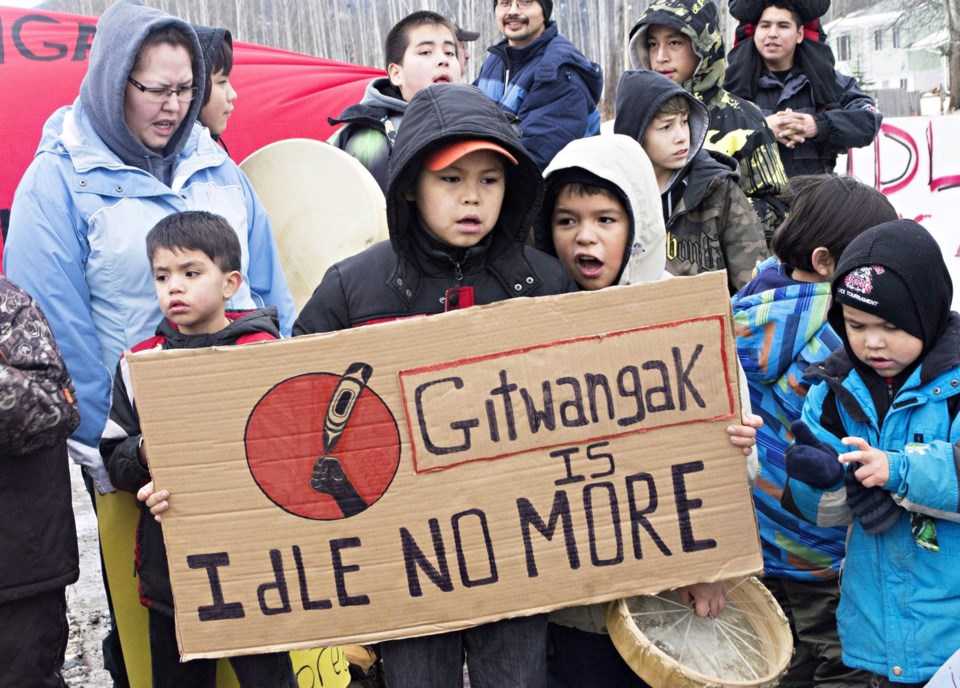OTTAWA — A First Nations chief is warning that Canada is "staring down the barrel" of another wave of protests like the Idle No More movement if governments pursue "national interest" projects without their input and consent.
Anishinabek Nation Regional Chief Scott McLeod has joined Indigenous leaders from across the country who say they're alarmed by government efforts to accelerate infrastructure development.
The federal government is developing a bill to fast-track what it calls "nation-building" projects with a streamlined regulatory approval process as a substitute for reviews under the Impact Assessment Act.
A handful of First Nations leaders told The Canadian Press Friday they were sent a letter Monday outlining the federal government's plans.
They say Ottawa has asked them to report any concerns they have about those plans by Friday — even as wildfires continue to blaze in the Prairies and as chiefs in Ontario mount opposition to the province's own infrastructure bill.
McLeod said Anishinabek Nation was only formally briefed on Ottawa's plans on Friday.
"With Prime Minister Mark Carney, we don't even have a relationship yet," he said.
"And trying to pass a bill in this way, without even talking to First Nations leadership, is a very rocky start for the Liberal government."
The federal minister of Crown-Indigenous relations did not immediately respond to a request for comment.
In Ontario, Premier Doug Ford is pursuing legislation — Bill 5 — that would enable cabinet to designate "special economic zones" where companies or projects wouldn't have to comply with selected laws or regulations.
The government of British Columbia recently passed the Infrastructure Projects Act — which allows it to fast-track things like critical minerals projects it deems to be in the province's interests — over fierce opposition from First Nations.
The Alberta government announced earlier this year it would move to speed up permit approvals for developments it considers low-risk.
And in Quebec, First Nations leaders have held blockades and protests in at least three communities and in downtown Montreal in response to the province's Sustainable Forest Development Act, which would allow for more natural resource development.
McLeod said chiefs have been sending provincial and federal officials "warning shots" about the sorts of disruptions such projects could face if Indigenous communities are not properly consulted.
National Chief Cindy Woodhouse Nepinak of the Assembly of First Nations, who met with Carney Thursday afternoon, issued her own warning to the provinces and Ottawa.
She said it "may not end well" if they make decisions about major infrastructure projects at next week's first ministers meeting in Saskatoon without First Nations involvement.
The Assembly of First Nations has long called for its inclusion at first ministers meetings but has only been able to secure secondary meetings with prime ministers ahead of the official meetings.
Nepinak said that, given the stakes of the upcoming meeting, the lack of First Nations representation is "very disrespectful." Federation of Sovereign Indigenous Nations Vice Chief David Pratt, meanwhile, is calling for governments to "smarten up."
Woodhouse Nepinak said the Assembly of First Nations is only aware of "bits and pieces" of the proposed federal legislation.
"We are concerned about what we are seeing from the government so far, and based on what I'm hearing about similar proposals in Ontario, in British Columbia and Alberta," she said.
"I fear that this may not end well."
McLeod said the last time Indigenous leaders saw something like what the federal government is proposing now was "in 2012 with Bill C-45, that had a lot of the same language and the same impacts on First Nations, which sparked Idle No More."
"We all know what happened then."
The Idle No More movement was triggered by that omnibus bill, introduced by then-prime minister Stephen Harper's government.
Indigenous leaders said the bill, intended to ramp up resource development, would trample on their rights while giving governments and businesses more authority to develop resources without thorough environmental assessments.
Leaders allied with the Idle No More movement staged protests, rallies and blockades on railway lines and highways and earned widespread support from across the country.
"We're informing the grassroots people and they're going to take it upon themselves on what actions are required to deal with the government's inaction," McLeod said.
One of those grassroots people in Ontario is Anishinabek Nation youth councillor Terra Roy, who said young people will be "watching very closely" to see what the federal and provincial governments do next.
"We're not afraid to show up and to be loud about it," Roy said.
This report by The Canadian Press was first published May 30, 2025.
Alessia Passafiume, The Canadian Press



